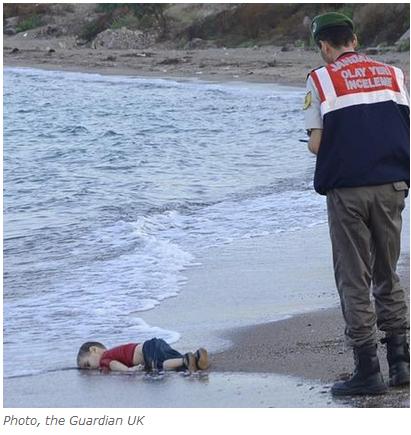There’s a great old expression: there’s the winning team and then there’s the learning team.
But sometimes losing can seem all there is.
 It hardly seems like there should be a thought, besides horror and despair, at the sight of images, this week, of a lifeless young boy found lying face-down on a beach near the Turkish resort of Bodrum. Aylan Kurdi was one of at least 12 Syrians who drowned attempting to reach Greece in a desperate bid to escape violence at home.
It hardly seems like there should be a thought, besides horror and despair, at the sight of images, this week, of a lifeless young boy found lying face-down on a beach near the Turkish resort of Bodrum. Aylan Kurdi was one of at least 12 Syrians who drowned attempting to reach Greece in a desperate bid to escape violence at home.
The issue of refugees and the humane need for other countries to offer a safe haven had been mired in abstract thoughts about hordes of faceless people attempting to storm European borders. Worse was the dismissal that the refugees were largely Moslems wishing to bring their foreign attitudes to a gullible west.
These images and this boy’s story have changed all that, not because it depicted something we didn’t already know, but because it told it in a way that went straight to people’s hearts.
So why is this now different and why is the impact so sudden and decisive? There’s an old maxim that says a million deaths is a statistic, but a single death is a tragedy. That’s because large numbers of people create a distance between us and the reality of other peoples’ plight. A tragedy in another town or the other side of the world always seems less concerning than one in our own street. The images of a little lifeless boy makes it singular, unequivocal and emotionally real. We are confronted and we either ‘get it’ or we are just bloody heartless.
To reinforce the fact, the boy was clearly identifiable as a dark-haired toddler, wearing a bright red t-shirt, little blue shorts and valcro shoes. Yes, he was someone’s son, a brother and a much loved member of a family who had dressed him, feed him and gave him hugs, just like the kids in our own families.
It's stating the obvious, but these lessons can be taken into how any number of causes should be communicated in order to gain support. Obviously, the more a cause can be shown as someone’s story – not just many peoples’ story – and told visually, authentically and with compassion, the more likely people will respond positively.
It does seem slightly sad and disrespectful to take a lesson from a little boy’s tragic death, but the world is full of issues and causes where it is all too easy to forget that it always comes back to individuals, like Aylan Kurdi.
 Fraser Carson is grateful to have the opportunity to share knowledge and ideas through this blog. He is the founding director of Flightdec.com, The Crowd Blog.com, Wotzon.com and Issues.co.nz. Fraser is a marketer and communications expert, and a developer and commentator on online and community building issues with a particular interest and involvement in the Collective Impact method of working cooperatively.
Fraser Carson is grateful to have the opportunity to share knowledge and ideas through this blog. He is the founding director of Flightdec.com, The Crowd Blog.com, Wotzon.com and Issues.co.nz. Fraser is a marketer and communications expert, and a developer and commentator on online and community building issues with a particular interest and involvement in the Collective Impact method of working cooperatively.
